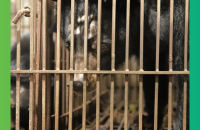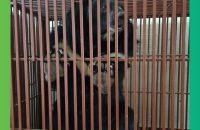
Last week as the world celebrated Valentine’s Day, Animals Asia staff took to the streets in Chengdu, bear hugging passers-by. We look at how Animals Asia is ending bear bile farming, whether it’s a single hug, a tweet to millions or through media stories with a potential audience of over a billion.
In Animals Asia’s sanctuaries in China and Vietnam, music plays an integral part in an enrichment process for our rescued bears.
Bears enjoy listening to a diversity of music, from Beethoven to The Beatles and, on Valentine’s Day, while All You Need is Love played to an appreciative furry audience, staff were out in the streets of Chengdu, sharing the ursine love, one bear hug and leaflet at a time.
Earlier this year, when Chinese superstar Sun Li visited a bear named in her honour at Animals Asia’s sanctuary, our updates on Chinese version of Twitter, Weibo, were immediately re-shared by the actress herself and subsequently her celebrity friends. Sun Li alone has 4.5m followers.

Sun Li’s ambassador role helps her continue to shine the spotlight on Animals Asia and ending bear bile farming. Equally influential is actress and singer songwriter Karen Mok. So loved in China, she was a torchbearer at the Beijing Olympic Games and sang in both opening and closing ceremonies.
When Chinese basketball superstar Yao Ming added his voice to the debate, he was absolutely clear:
"Support Animals Asia and help the moon bears. I am against bear farming and want it to end."
It’s an approach that is paying dividends - continuing to grow both awareness and support.

Animals Asia founder Jill Robinson explained: :
“Last year saw an upsurge in coverage and subsequently public awareness and support. Our profile, that we have worked hard to grow, meant that in one month alone we featured in over 8,300 Chinese-language press articles.
“Just as the work to care for the bears in our sanctuaries is an everyday labour of love, equally our over arching aim to bring about the end of bile farming means our staff worldwide work as tirelessly as bear workers and veterinary staff. For our communications staff this means relentless messaging, accurately and intelligently spreading the news."
When Chengdu Evening Daily first posted pictures depicting the horrors of bear bile farming, the story received over two million hits, with 90% of reader reactions being for Animals Asia’s work and against bile farms. See newspaper editor Jiang Bing interviewed in Moon Bears Journey to Freedom, which aired on Animal Planet.
However the awareness campaign and sanctuaries in China and Vietnam are just part of a five-pronged focus. The other three being reducing demand by working with the traditional medicine community, engaging with the Government and mapping the bile trade to highlight its unpalatable and illegal trail.
In Vietnam, staff are putting the finishing touches to a publication that will be issued to traditional medicine practitioners — a comprehensive and detailed listing of the assorted herbal alternatives to bear bile.
In 2009, Animals Asia founder Jill Robinson was elected a Council Member of the World Federation of Chinese Medicine Societies (WFCMS) Herbal Committee.
In Vietnam, as with China, state-run media means headlines can’t be taken for granted but work with Government has meant Animals Asia has been allowed a share of the spotlight. It’s meant that, even during the recent campaign to save our Vietnam sanctuary from eviction, we were able to highlight and argue our case in the local media.
Animals Asia and Government policy may not always be aligned, but widespread support and on-going work and determination to build partnerships and understanding has seen our organisation grow in respect and influence in Asia.
In 2010, Animals Asia’s work was recognised when Jill accepted a "You Bring Charm to China” award at a ceremony held by Phoenix Satellite Television and Tianjin TV to recognise 12 prominent foreigners, who have enriched Chinese life.

The work goes on. In 2012, Animals Asia’s Love Moon Bears Week saw thousands in Beijing, Shanghai and Chengdu take part in music festivals, bike rides and school events – a success that reached many millions more via the accompanying publicity.
Meanwhile with so much of the bile being consumed by tourists, Animals Asia is specifically targeting tourists and tourism organisations to reduce cross border trade between South Korea, China and Vietnam. In Vietnam, we are targeting the tourist hot spot of Halong Bay, a big favourite with visitors from South Korea. Our staff visit the area to hand out multi language leaflets warning of the illegality of bear bile and to assist those that enforce the law for a tangible impact.
Jill Robinson added:
“In China we’re talking about an audience of over a billion and there’s a further 88 million in Vietnam. Reaching these populations is vital but also our on-going campaigns are about key individuals. We’re engaging with those who can influence policy and change, while continuing to reach out to those at the centre of the industry such as the farmers themselves who, in both China and Vietnam, have been known to simply step away from the industry and turn over their bears to us.
“Externally we aim to raise support and shine a world spotlight on the issue – internally the message is clear. Stop the use of bear bile, expose the illegality of the trade, and end the industry itself.
“To be where we are today, with a sizeable chunk of the population behind us, including influential celebrities and members of the media, is incredible. The fact that we have been allowed to achieve this is, in no small part, down to our relationship with respective Governments, but there is no room for complacency – each day the fight starts again.”
With an eviction stopped in Vietnam and a bear rescue in China, 2013 is shaping up to be an incredible year for Animals Asia.
Still winning hearts and minds and happy to do it one bear hug at a time.

For further reading:
Jet Li’s charity foundation recognises “Moon Bear” film with three awards
Chinese basketball superstar Yao Ming visits bears rescued from bile extraction industry
Scientific studies reveal brutal truth of bear farming industry
Bear bile harmful to human health, according to research released at major Beijing event
RELATED ARTICLES
 Tổ chức Động vật Châu Á cứu hộ 2 cá thể gấu ngựa từ Yên Bái về Trung tâm Cứu hộ Gấu Việt Nam tại Bạch Mã
19 April 2025
Tổ chức Động vật Châu Á cứu hộ 2 cá thể gấu ngựa từ Yên Bái về Trung tâm Cứu hộ Gấu Việt Nam tại Bạch Mã
19 April 2025
 Học sinh Trường THCS Phú Diễn A hưởng ứng Ngày hội Tiếng Anh với chủ đề Bảo vệ Động vật Hoang dã và khánh thành Vườn thảo dược Bảo vệ loài gấu
16 April 2025
Học sinh Trường THCS Phú Diễn A hưởng ứng Ngày hội Tiếng Anh với chủ đề Bảo vệ Động vật Hoang dã và khánh thành Vườn thảo dược Bảo vệ loài gấu
16 April 2025
 Tổ chức Động vật Châu Á thực hiện chuyến cứu hộ đầu tiên của năm 2025 về Trung tâm Cứu hộ Gấu Việt Nam tại Bạch Mã
3 April 2025
view all
Tổ chức Động vật Châu Á thực hiện chuyến cứu hộ đầu tiên của năm 2025 về Trung tâm Cứu hộ Gấu Việt Nam tại Bạch Mã
3 April 2025
view all